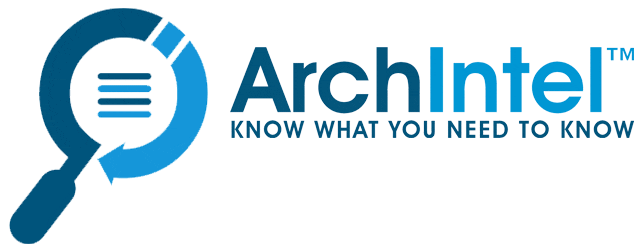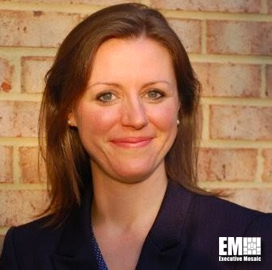Rebecca John, vice president of Capture with ECS Tech, recently spoke with ArchIntel to discuss the lessons, discovery methods and decision making process involved within competitive intelligence as well as how these standards will evolve over time as the world adapts to COVID-19, and technology is introduced into the marketplace.
“What’s become abundantly clear, especially during COVID-19, is the importance of that human relationship-building. It’s always been important, but we’ve also learned that entrance-level tools in the market are never going to actually replace those conversations you get with acquaintances, that enable you to build your network and drive personal development. That makes competitive intel a lot more insightful.”
ArchIntel: What are some of the insightful lessons you’ve learned throughout your career in competitive intelligence?
“Number one, competitive intelligence is constantly changing. It’s not something that you can market a year ago and then it stays static because people change their minds. Capturing that information with a timestamp is so important.
From a historical perspective, I use a lot of the decision support tools to do analytics to see how that information evolves. Competitive intelligence seems like a check-the-box activity, but the critical thinking behind that and applying logic and analytics to it makes a drastic difference as I’m looking at the data.
From a competitive standpoint, when I started out my career in the federal marketplace, my perspective is always coming from the direct-in-line customer. I constantly ask: ‘What do they want? How do we get that to them?’
My approach has been very organic in nature and has been very fueled by my background in direct delivery. It’s more of an evolution, less a complete migration from one method to another.
My day-to-day activities are in support of the overall company strategy and vision for who we want to be and how we’ve grown to get there. It’s all very driven by what is that goal. What is that vision and strategy for these customers?”
ArchIntel: How do you compile a dataset to derive competitive intelligence?
“My day always does start with reading the morning collection of news to see what has changed overnight in Washington. I then have to figure out how that might change some of those activities involving data collecting, the build upon that through phone calls and emails and collection points with counterparts to ensure that information is documented, drafted and dispersed among my team so that we can all move ahead.
There’s so much information out there from a competitive intelligence gathering perspective. We have spent a lot of time automating rules and alerts with tools to combat against information overload. You cannot read every single article or every single bit of information out there, so we spend a lot of time making sure that all we really need to pay attention to is rising to the top.
At the end of the day, money talks. Budgets are wildly important. Appropriations and how those things are coming out are important, as well as various companies’ financials if you’re looking to move ahead in that particular market.
A lot of our strategy revolves around using the resources, the talent and the understanding that we have as part of our executive team. We work very tightly in this area to make those decisions. After we’ve collected the data and we gain a deeper understanding, we can move forward in our decision making.”
ArchIntel: How do you drive growth in the competitive intelligence sector?
“Having that healthy mix of new contracts, understanding where to make strategic shots and where we invest our time and our resources drives growth. Competitive intelligence definitely helps fuel where we decide to put our money and our resources.
We also focus on how to maintain that healthy mix between acquisitions, growing our work and launching out into new work. From competitive intelligence, we have invested in our team by using augmented tools as well as expanding our group of analysts who are responsible for researching and finding trends to feed our overall teams.
We build our teams based on the quality of the resources that we have to empower them to do their jobs. We get our workforce the tools that they need to do it, train them and invest in them as people. That is one of the critical things that we very much focused on in building our team here: not letting them alone to sit and run things in the background.
You only get so far if they don’t understand the bigger picture. If they don’t understand the why, they don’t understand the business strategy. That is the reason why we need these analytics. We need this decision and we need this intelligence.
We ensure that those analysts are involved from a higher level, which is definitely helpful for career development and growth, but it also produces better quality support and information that we gather.”
ArchIntel: How do you measure success in competitive intelligence?
“It comes down to: did we support the business? Did the business achieve their goals? Ultimately, if our business strategy was met for the year, we did the best job in order to support our teams. That’s the point of the competitive intelligence team.
Revenue in the door is highly important. It’s not just short-term. While short-term success is great, competitive intelligence is a long-term game. Understanding what happened and what drove an outcome is critical. That is the goal of competitive intelligence: the long-term success of the business.”
ArchIntel: What are some of the ethical implications when working in the field of competitive intelligence?
“Your reputation and the way you do business will drive long-term success. Washington is a very small place. Doing things that are unethical in nature is going to be detrimental to the business.
We also research tools and artificial intelligence (AI) to see how they are feeding our worldview. I always believe in honoring your word, doing the right thing and working in good faith across the market.”
ArchIntel: With the evolution of internet and technology, how do you see competitive intelligence advancing in the coming years?
“There are a lot of tools that are trying to be the end-all, be-all. It used to be that you had to go to multiple sources in order to collect all the data that you needed. There has definitely been a drive to consolidate sources of record, which will collect information from multiple channels.
It’s definitely speeding up the process and decision making as it relates to those tools. The counterpart of that is information overload, and understanding what is actually important and what is credible. You’ll never replace those direct communications that you have with people with a tool.
Altogether, the consolidation of information is just getting stronger. Over time, the ties between the things are definitely more highlighted within the tools that are being developed that help to speed up all our decision making processes.
Having analysts that are just data consolidators, having analysts that are applying business logic and business strategy to data and the empowerment behind that is crucial to move that ahead. The business decision making can never replace a human completely with a tool.
We’re always going to see people who truly understand the marketplace, and who understand the technology and the dynamics of the relationships that play between the stakeholders. That has to be applied to produce intelligence.”

